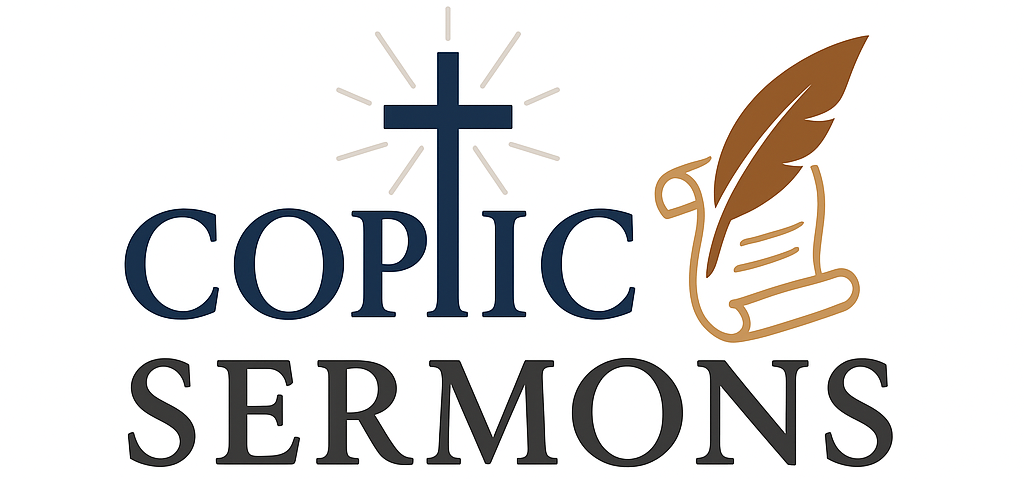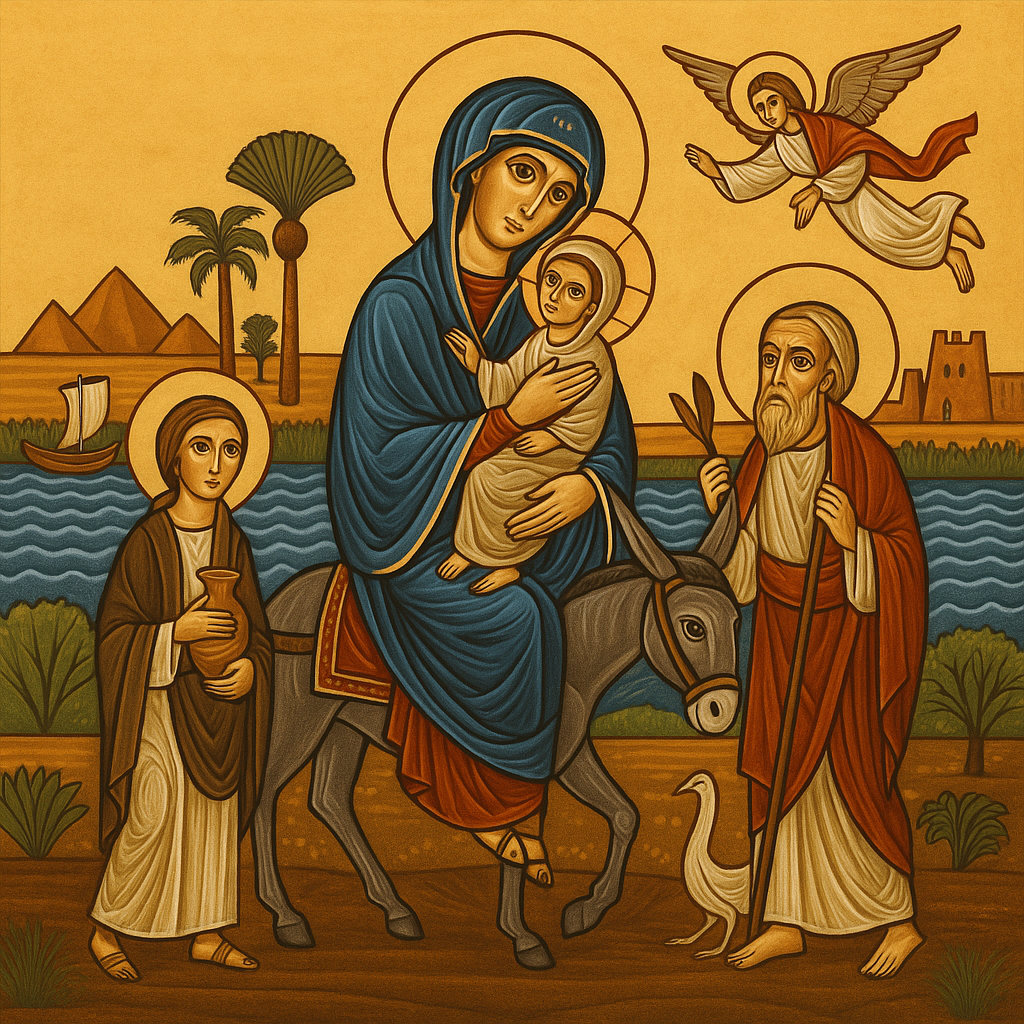Entry into Egypt – Foreshadowing Image of the Cross
In the Name of the Father, and the Son, and the Holy Spirit, One God. Amen. May the blessing of the Father who calls us and His Only Begotten Son Jesus Christ who saves us, and the Holy Spirit who sanctifies and transforms us be with us all, that we may hear His word and bear fruit—thirty, sixty, and a hundredfold. Amen.
In this Feast, a Foreshadowing Image of the Cross
In the flight of the Lord Jesus from Jerusalem to Egypt, we see a foreshadowing image of the Cross. It declares the rejection of the crucified Christ: “He came to His own, and His own did not receive Him.” The holy city did not accept Him, and she is the one who later cried, “Crucify Him.” “We have no king but Caesar” (John 19:15).
And in the fall of idols and the fleeing of demons upon His entry into Egypt—which were manifest signs of His authority even before His crucifixion (Luke 4:41)—we see a foreshadowing image of the Cross, in which “He disarmed principalities and powers” (Colossians 2:15), and delivered us from the dominion of sin (Hebrews 2:14).
In this feast, the prophecy is fulfilled about God’s work in the Egyptians: “I will set signs in Egypt, and it will tremble in its core.” In this way, the feast presents an image prefiguring the Cross of Christ, who “is the power of God to us who are being saved” (1 Corinthians 1:18). For the one who performed miracles from His childhood and made rivers of living water flow from His belly, has also turned the heart of the hard-hearted land of Egypt to the worship of God.
Athanasius the Apostolic, defender of the Orthodox faith, and Diocorus the confessor, and Anthony the founder of monasticism—all came from Egypt. It is a prefigurement of the Cross that transforms the human heart from evil to the love of God.
In this feast is an image of the fruits of the Cross, “which reconciled the two in one body through the cross, putting to death the enmity” (Ephesians 2:16)—and so, the entry of the Lord Jesus into the land of Egypt.
The land of Egypt, which had once carried an ancient curse because of its pride and rebellion and hard heart (Jeremiah 46:9), now had the blessing of God placed upon it: “Blessed is My people Egypt.” The entry of Christ into Egypt declared to humanity a joyful gospel (Isaiah 19:25) with the forgiveness of God—it was a foreshadowing image of the reconciliation that was completed on the Cross.
Therefore, the entry of the Lord Jesus into the land of Egypt is the feast of Egypt and the Egyptians. For the Spirit says, “Out of Egypt I called My Son” (Hosea 11:1), and it is also the feast of all humanity.
May the Lord sanctify our hearts on this feast—that He may enter them, and we may be broken, and our idols shattered, and He may dwell in them as a holy temple. Let us rejoice in His blessed coming, and walk in this glorious feast. Amen.
Mental Health Reflection: Fleeing, Fear, and the Silence of God
When Joseph awoke from his dream, he didn’t speak. He didn’t question. He didn’t delay. He simply rose in the night and took the young Child and His mother and fled to Egypt (Matthew 2:14). That one verse carries the weight of what so many of us experience today—fear, urgency, confusion, and obedience without clarity. Joseph had no map, no timeline, no assurance of safety. But he had the Word of God whispered in the silence of the night.
Saint John Chrysostom teaches:
“Joseph does not delay; he does not question, he does not speak even one word, although the angel had said nothing more than ‘flee to Egypt.’ This is the obedience of faith, when the soul follows God even in fear.”
(Homily on Matthew 8)
This is the reality of many people’s mental health battles today. We feel fear, we carry burdens, and we are overwhelmed by responsibilities—parenting, financial strain, uncertainty, even the fear of illness or harm. And yet, like Joseph, we are called to trust that God leads in the quiet, through what might seem like escape but is actually protection.
When the Holy Family fled, it was not weakness. It was wisdom.
Anxiety often makes us think we are failing when we retreat. But in God’s plan, sometimes the retreat is holy. Sometimes, Egypt is the place of preservation until Herod’s wrath has passed.
Mental Health Application:
- When overwhelmed, don’t dismiss your need for stillness. Joseph teaches us that silence is not absence. God speaks in the night hours, in whispered dreams, in subtle redirection.
- Psalm 77:11–12 (NKJV) invites us to meditate: “I will remember the works of the Lord; surely I will remember Your wonders of old. I will also meditate on all Your work, and talk of Your deeds.” This is the rhythm of spiritual healing: remember, meditate, speak.
- Write it down. Ask yourself in journaling or prayer: “What is the Egypt I am in today?” “What looks like exile but might actually be my place of transformation?”
Saint Macarius the Great once said:
“The soul must be driven into the wilderness to learn trust. Even demons are silenced in the presence of obedience.”
Just as Egypt became a land of divine visitation, your season of instability can become your altar—if Christ is with you in it.
Practical Takeaway: Where Is God Leading Me Now?
Joseph obeyed without knowing where the road would end. But God turned every detour into divine direction.
Ask yourself today:
- Where is God calling me to flee—not out of fear, but for formation?
- What is my Nazareth?—that hidden, quiet place where Christ grows in me?
Saint Cyril of Alexandria reminds us:
“Egypt was not a shameful hiding place, but a sacred beginning. For from it shone the light of salvation to all nations.”
(Glaphyra on Hosea 11:1)
So many of us wait for peace to begin in familiar places. But the Holy Family shows us that sacredness is not about geography—it’s about God’s presence.
Let every family reflect today on the icon of the Holy Family in Egypt:
- The palm tree bowing in reverence.
- The Nile flowing gently behind them, a symbol of God’s provision.
- The donkey, faithful in its simplicity, carrying the burden of salvation.
- The faces of Christ, Mary, and Joseph—unafraid, yet quiet and watchful.
🕯 Sit with this image. Let your children look at it and ask, “Where is Jesus leading us today?”
Let your home become like Egypt—not a place of escape, but a place of visitation, guidance, and silent obedience.
Conclusion: Return from Egypt
“Then he arose, took the young Child and His mother, and came into the land of Israel… and dwelt in a city called Nazareth.” (Matthew 2:21–23). After Egypt comes Nazareth. After the flight comes fruit. After the wilderness comes wonder. Let us never despise the detours of God’s providence. They may be the very roads that lead us into the fulfillment of His will.
May the Lord bless us, transform our hearts and minds, that our homes may stand on the Rock, our hands serve in the harvest, and our hearts long for Heaven. Amen.

